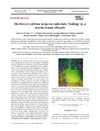Please use this identifier to cite or link to this item:
https://accedacris.ulpgc.es/jspui/handle/10553/49561
| Title: | Herbivory drives kelp recruits into 'hiding' in a warm ocean climate | Authors: | Franco, João N. Wernberg, Thomas Bertocci, Iacopo Duarte, Pedro Jacinto, David Vasco-Rodrigues, Nuno Tuya, Fernando |
UNESCO Clasification: | 241705 Biología marina | Keywords: | Atlantic Ocean Portugal Habitat complexity Climate Kelp forests, et al |
Issue Date: | 2015 | Publisher: | 0171-8630 | Journal: | Marine Ecology - Progress Series | Abstract: | Assessing effects of herbivory across broad gradients of varying ocean climate conditions and over small spatial scales is crucial for understanding its influence on primary producers. Effects of herbivory on the distribution and abundance of kelp recruits were examined experimentally at two regions under contrasting ocean climate. Specifically, the abundance and survivorship of kelp recruits and the abundance of macro-herbivores were compared between a ‘cool’ and a ‘warm’ region in northern and central Portugal, respectively. In each region, the abundance of kelp recruits and the intensity of grazing were compared between habitats of different topography within reefs (open reef vs. crevices). Compared to the ‘warm’ region, the abundance of kelp recruits was 3.9 times greater in the ‘cool’ region, where 85% of recruits were found in open reef habitats. In contrast, 87% of recruits in the ‘warm’ region were restricted to crevices. The ‘warm’ region had 140 times greater abundances of sea urchins, 45 times more herbivorous fish and 4.1 times more grazing marks on kelp recruits than the ‘cool’ region. Grazing assays showed ca. 50 times higher rates of kelp biomass consumption, mainly by fishes, and zero survivorship of kelp recruits in the ‘warm’ relative to the ‘cool’ region. This study suggests both temperature and herbivores affect abundances of kelp recruits across latitudes, and demonstrates how herbivores affect their distribution at local scales, driving kelp recruits into ‘hiding’ in crevices under intense herbivory. Consequently, where net recruitment success is compromised by herbivory, the persistence of kelps will be contingent on availability of topographical refuges. | URI: | https://accedacris.ulpgc.es/handle/10553/49561 | ISSN: | 0171-8630 | DOI: | 10.3354/meps11445 | Source: | Marine Ecology Progress Series [ISSN 0171-8630], v. 536, p. 1-9 |
| Appears in Collections: | Artículos |
SCOPUSTM
Citations
53
checked on Jun 8, 2025
WEB OF SCIENCETM
Citations
58
checked on Feb 15, 2026
Page view(s)
279
checked on Jan 16, 2026
Download(s)
145
checked on Jan 16, 2026
Google ScholarTM
Check
Altmetric
Share
Export metadata
Items in accedaCRIS are protected by copyright, with all rights reserved, unless otherwise indicated.
